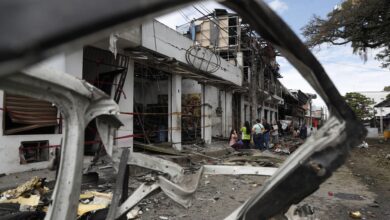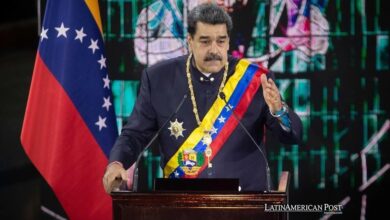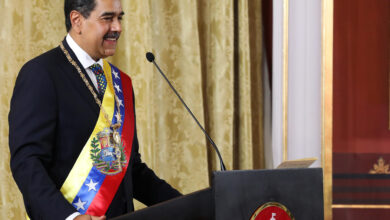International Human Rights Observation Mission concludes the persistent criminalization of defenders and militarization in indigenous areas of Mexico, urging government action for the protection and compliance with international human rights standards .

01/12/2023.- The member of the European Parliament and the Group of the Greens/European Free Alliance, Diana Riva (d), speaks with the defender of the Land and Territory, Pascuala López, during a press conference in Ciudad de Mexico (Mexico). EFE/Mario Guzmán
EFE
Escucha este artículo
Leer en español: Misión internacional denuncia la criminalización de activistas y militarización en México
The criminalization of human rights defenders and the militarization of indigenous territories persist as a major problem in Mexico, the International Human Rights Observation Mission in Mexico concluded this Friday after a visit of several days to the center and southeast of the country.
“Several patterns of attacks, criminalization and stigmatization have been identified that not only have not stopped but have been intensifying in the last year, added to the lack of risk analysis and effective measures by the entities in charge of guaranteeing their safety. and the work of defending human rights,” said Diana Riva, member of the European Parliament and the Group of the Greens/European Free Alliance.
Dialogue with Authorities and the Case of Pascuala López
Organizations that are part of the 'Mexico-European Union Platform for Peace and Human Rights' carried out a visit to the central and southeastern areas of Mexico between last Friday and Thursday, in which they spoke with federal authorities about the protection of defenders and journalists.
During this visit they encountered cases such as that of Pascuala López, defender of the land and territory of her community in Chiapas, southern Mexico, where after the murder of her son she began a fight in search of justice and reparation.
“We are also extremely concerned about Pascuala's case, as well as that of many other defenders in Mexico in community contexts because the damage and risk continue and are permanent,” said Víctor Hugo López, technical secretary of the All Rights Network for All and All (TDT).
In Chiapas, especially, they documented the cases of people unjustly deprived of their liberty and tortured survivors who fought to obtain justice.
“In the state of Chiapas, the judicial system fails in its responsibility to deliver justice and in this sense these failures generate what they call a 'culprit factory', since the prisons are full of innocent people deprived of their liberty,” Pablo argued. Ramírez from the Taula per Mèxic organization.
Militarization and Industrial Implications
Regarding militarization, Ramírez specified “cases were observed such as that of the Believer People of Chicomuselo and that of the People's Front in Defense of Land and Water – Morelos, Puebla, Tlaxcala (FPDTA-MPT) where militarization processes exist. linked to industrial taxation,” he said.
The organizations also documented the case of activist Kenia Hernández, an indigenous woman held for three years in a maximum security prison in the Morelos prison because, according to a judge, “she protested a lot and was a harm and danger to the community.”
Call to Coordinated Action
According to Aurora de la Riva, from the National Network of Human Rights Defenders in Mexico, Hernández has been a victim of discrimination in prison, by denying her access to friends and family for her visit.
“The integrity of Kenya has also been endangered on different occasions regarding health issues,” he denounced.
Read also: Claudia Sheinbaum Maintains Strong Lead in Mexico's Presidential Race
Given this, the organizations asked to adopt coordinated actions at different levels of government to guarantee the right to defend human rights.
Likewise, it guarantees due process to detained defenders and implement international standards on human rights, strengthening the Federal Mechanism for the Protection of Human Rights Defenders and Journalists.




